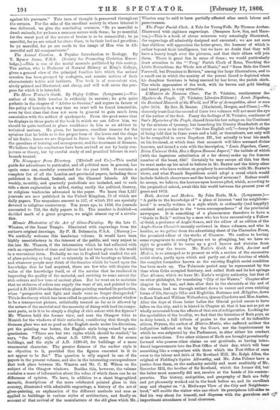Bath, Ancient and Modern. By John Earle, M.A. (Longmans.)— "A
guide to the knowledge of" a place of interest "and its neighbour- hood " is usually written in a style which is ordinarily (and happily) confined and peculiar to the "town correspondence" of the provincial newspaper. It is something of a phenomenon therefore to have a. "Guide to Bath" written by a man who has been successively a Follow of Oriel, a professor of AnglolSamoa, and the editor of an edition of the Anglo-Saxon Chronicle recently reviewed in these columns, and who is as we gather from the advertising sheet of the Clarendon Press, the promised editor of the works of Chaucer. We confess to having some repugnance to seeing Pegasus set to ploughing, but we have no- right to grumble if he turns up a good furrow and abstains from kicking over the traces. Mr. Earle's Guide to Bath, Ancient and Modern, is so arranged as to present us with a section of the successive social strata, partly upon which and partly out of the detritus of which, the complex formation known as the existing English social condition has been made up. The Palaeozoic period may be represented by the time when Celts occupied Solsbnry, and called Bath and its hot springs- Utter Akeman, which we have Mr. Earle's weighty authority, but that of no other philologist, for translating "City of the Waters." Chapter after chapter in the text, and date after date in the chronicle at the end of the volume, lead us through extinct down to recent and even existing- forms of life, through Offas and Ecgfriths, Bartanas and /Elfgyf us, down to Beau Nash and William Wilberforce, Queen Charlotte and Miss Austen. After the days of these latter ladies the Glacial period seems to have fallen on the city, and it is hinted in Chapter xi. that it has not as yet as wholly recovered from the effects of that era of refrigeration. Looking for the specialities of the locality, we find that the historian of Bath pays, as in duty bound, a full tribute of praise to the merits of its inflexible citizen, Prynne, the author of Histrio- Masa.; who suffered neither the indignities inflicted on him by the Court, nor the imprisonment to which he was subjected by the Parliament, to alter either his conduct or his convictions. Two other citizens of Bath are broughtprominently forward who possess other claims on our gratitude, as having intro- duced improvements into the Rid Office of their day, which will bear something like a comparison with those which the Post Office of ours owes to the labour and faith of Sir Rowland HilL Mr. Ralph Allen, the original of Fielding's Sinks Allworthy, and Mr. John Palmer have a justice done them, on the authority notably and most creditably of Mr_ Recorder Hill, the brother of Sir Rowland, which the former did, but the latter most assuredly did not, receive at the hands of his contem- poraries. The history, antiquities, and geography of Bath are fully and yet pleasantly worked oat in the book before us, and its excellent
map and chapter on "A Bird's-eye View of the City and Netghbour- hood," will enable the visitor who can climb its precipitous hill-sides to find his way about for himself, and dispense with the garrulous and 41 impertinent attendance of local cicerones. -






























 Previous page
Previous page